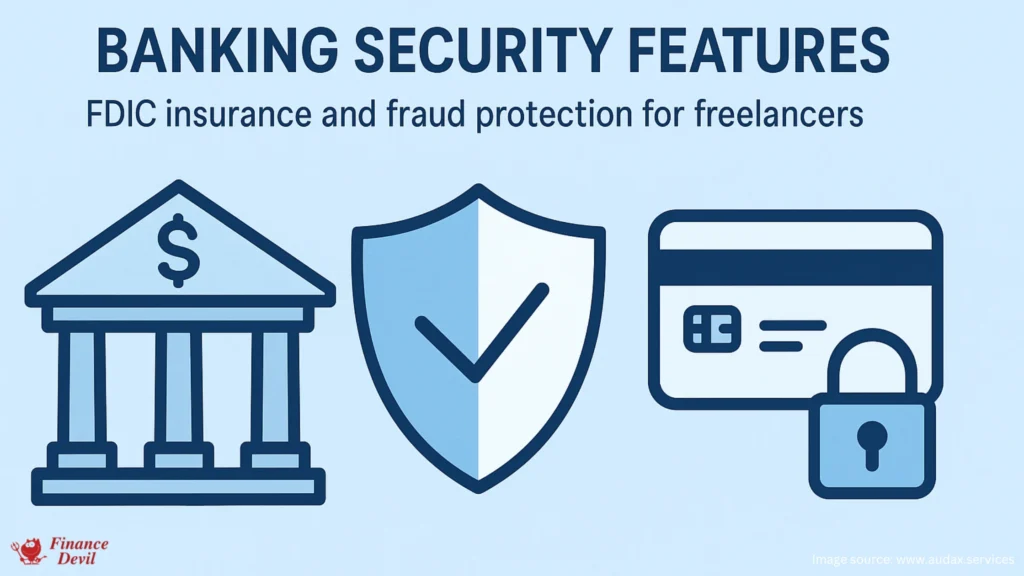
The freelance economy in the United States has exploded, with over 73.3 million Americans working as freelancers in 2024 according to recent industry studies. As this workforce continues to grow, the need for specialized banking solutions has never been more critical. The best checking accounts for freelancers offer unique features that traditional personal accounts simply cannot match, including seamless integration with business tools, tax planning assistance, and fee structures designed for irregular income patterns.
Choosing the right checking account as a freelancer isn’t just about finding a place to store your money—it’s about establishing a financial foundation that supports your business growth, simplifies tax preparation, and provides the tools you need to succeed in today’s competitive gig economy. This comprehensive guide will help you navigate the complex landscape of business banking to find the perfect account for your freelance career.
Why Freelancers Need Specialized Checking Accounts
The Legal and Financial Imperative
While technically not required by law, having a dedicated business checking account is essential for freelancers who want to maintain professional credibility and financial organization. The Internal Revenue Service (IRS) requires clear separation between personal and business expenses for tax purposes, and mixing funds in a personal account can create complications during audits or tax preparation.
Key Benefits of Business Checking Accounts for Freelancers:
- Tax Compliance: Simplified record-keeping for quarterly tax payments and annual filings
- Professional Image: Business checks and account details enhance client confidence
- Legal Protection: Clear financial boundaries support potential liability protection
- Banking Compliance: Many banks prohibit business transactions on personal accounts
- Financial Tracking: Dedicated accounts make income and expense tracking effortless
The Self-Employment Tax Advantage
Freelancers earning more than $400 annually must pay self-employment taxes at a rate of 15.3%. Many of the best checking accounts for freelancers include automatic tax calculation and savings features, helping you set aside the appropriate amount from each payment received. This proactive approach prevents the shock of large quarterly tax bills that catch many new freelancers off guard.
Top 11 Best Checking Accounts for Freelancers in 2025
1. Bluevine Business Checking – Best Overall Online Business Account
Rating: 5.0/5
- APY: 1.50% on balances up to $250,000
- Monthly Fee: $0
- Sign-up Bonus: $300 with qualifying activities
- Minimum Opening Deposit: $0
Bluevine consistently ranks as one of the best checking accounts for freelancers due to its impressive combination of high interest rates and zero fees. The account offers unlimited fee-free transactions, making it perfect for freelancers who process multiple client payments monthly.
Standout Features:
- Access to up to $3 million in FDIC insurance through Insured Cash Sweep
- Dedicated customer support representative for each account holder
- No overdraft fees or minimum balance requirements
- Free access to the MoneyPass ATM network
Best For: Freelancers seeking high-yield earnings on their business funds with comprehensive online banking features.
2. American Express Business Checking – Best for 24/7 Customer Support
Rating: 5.0/5
- APY: 1.30% on balances up to $500,000
- Monthly Fee: $0
- Sign-up Bonus: 30,000 Membership Rewards points
- Minimum Opening Deposit: $0
American Express brings its legendary customer service to business banking with round-the-clock support and competitive interest rates. The account integrates seamlessly with QuickBooks, making it an excellent choice for freelancers who prioritize professional accounting practices.
Standout Features:
- 24/7 customer support via phone and chat
- No fees on domestic incoming wire transfers
- Access to over 70,000 fee-free ATMs nationwide
- Membership Rewards points earning potential
Best For: Freelancers who value premium customer service and want to earn rewards on their banking activities.
3. Found Small Business Banking – Best for Integrated Tax Planning
Rating: 4.3/5
- APY: None specified
- Monthly Fee: $0
- Sign-up Bonus: $125 with qualifying activities
- Minimum Opening Deposit: $0
Found revolutionizes freelancer banking by automatically calculating and setting aside tax obligations from each deposit. This innovative approach to tax planning makes it one of the best checking accounts for freelancers who struggle with quarterly tax preparation.
Standout Features:
- Automatic tax calculation and savings
- Built-in invoicing and bookkeeping tools
- Direct integration with popular gig platforms (Uber, DoorDash, Etsy, PayPal)
- Dedicated banker assignment for personalized service
Best For: New freelancers who need comprehensive financial management tools and automated tax planning.
4. Chase Business Complete Banking – Best for In-Person Banking Needs
Rating: 4.6/5
- APY: None
- Monthly Fee: $15 (waived with $2,000 minimum balance)
- Sign-up Bonus: $500 with qualifying activities
- Minimum Opening Deposit: $0
For freelancers who prefer traditional banking with physical branch access, Chase offers one of the most comprehensive networks in the United States with 4,700 branches and 16,000 ATMs.
Standout Features:
- Extensive branch and ATM network nationwide
- Integrated credit card processing for client payments
- 24-hour overdraft grace period
- Zelle for Business integration for fast payments
Best For: Freelancers who frequently handle cash transactions or prefer in-person banking relationships.
5. Grasshopper Innovator Business Checking – Best for Debit Card Rewards
Rating: 4.8/5
- APY: Up to 1.80% with $25,000+ balance
- Monthly Fee: $0
- Sign-up Bonus: None
- Minimum Opening Deposit: $100
Grasshopper stands out among the best checking accounts for freelancers by offering unlimited 1% cash back on all qualified debit card purchases, effectively providing a continuous revenue stream on business expenses.
Standout Features:
- Unlimited 1% cash back on debit card purchases
- Built-in bookkeeping and invoicing software
- Free incoming domestic wire transfers
- No transaction fees or overdraft charges
Best For: Freelancers with significant monthly business expenses who want to earn rewards on their spending.
6. Relay Business Checking – Best for Multiple Debit Cards
Rating: 4.8/5
- APY: None
- Monthly Fee: $0
- Sign-up Bonus: $300 with qualifying activities
- Minimum Opening Deposit: $0
Relay excels in providing freelancers with advanced account management features, including the ability to issue up to 50 debit cards—perfect for freelancers managing teams or multiple projects.
Standout Features:
- Up to 50 debit cards per account
- No foreign transaction fees on international purchases
- Cash deposits available through compatible Allpoint ATMs
- Direct Shopify integration for e-commerce freelancers
Best For: Freelancers managing teams or multiple business entities who need sophisticated account controls.
7. NBKC Business Account – Best for Cash Handling
Rating: 4.6/5
- APY: None
- Monthly Fee: $0
- Sign-up Bonus: None
- Minimum Opening Deposit: $0
NBKC addresses a common freelancer pain point by offering unlimited cash deposits through MoneyPass and Allpoint ATMs, plus up to $12 monthly in ATM fee refunds worldwide.
Standout Features:
- Unlimited cash deposits via partner ATM networks
- Up to $12 monthly ATM fee refunds globally
- Unlimited debit cards for team members
- Contactless payment acceptance through mobile app
Best For: Freelancers in cash-heavy industries or those who frequently travel internationally.
8. North One Standard Business Checking – Best High APY Option
Rating: 4.7/5
- APY: 2.50% with no minimum balance requirement
- Monthly Fee: $0
- Sign-up Bonus: None
- Minimum Opening Deposit: $0
North One offers the highest APY among our top picks, making it attractive for freelancers who maintain substantial account balances and want maximum earning potential.
Standout Features:
- Industry-leading 2.50% APY with no minimum balance
- Same-day deposits from major payment platforms
- Sub-accounts for goal-specific savings
- Direct integration with popular e-commerce platforms
Best For: Freelancers with higher account balances who prioritize maximum interest earnings.
9. Lili Basic Business Checking – Best for Gig Workers
Rating: 4.1/5
- APY: None
- Monthly Fee: $0
- Sign-up Bonus: None
- Minimum Opening Deposit: $0
Designed specifically for gig workers and freelancers, Lili offers early payment features that can provide access to funds up to two days sooner than traditional banks.
Standout Features:
- Early payment access (up to 2 days sooner)
- Direct integrations with Square, Shopify, Etsy, and eBay
- Cash deposits through the Green Dot network
- No monthly fees or transaction charges
Best For: Gig workers and freelancers who need fast access to their earnings.
10. First Internet Bank Do More Business Checking – Best for Automatic Savings
Rating: 4.3/5
- APY: 0.50% with $10,000+ average daily balance
- Monthly Fee: $0
- Sign-up Bonus: None
- Minimum Opening Deposit: $0
This account excels in helping freelancers build emergency funds through automatic transfer features and offers competitive interest rates for higher-balance accounts.
Standout Features:
- Automatic savings transfer capabilities
- Up to $10 monthly ATM fee refunds
- 0.50% APY on balances over $10,000
- No overdraft fees or minimum balance requirements
Best For: Disciplined freelancers who want to automate their savings while earning interest on higher balances.
11. Security Service Federal Credit Union Premium Business Checking – Best for Business Perks
Rating: 4.2/5
- APY: 0.05% on balances of $1,500+
- Monthly Fee: $20 (waived with $50,000 average balance)
- Sign-up Bonus: None
- Minimum Opening Deposit: Not specified
This credit union option provides unique business perks including legal services and healthcare access, making it valuable for freelancers seeking comprehensive business support.
Standout Features:
- Access to network of attorneys with free/discounted services
- Mobile phone protection coverage up to $500 per claim
- 24/7 access to doctors and mental health professionals
- Enhanced business support services
Best For: Established freelancers with higher balances who value comprehensive business support services.
Essential Features to Evaluate in Freelancer Checking Accounts
Fee Structure Analysis
The best checking accounts for freelancers minimize fees that can erode irregular income. Key fee categories to evaluate include:
Monthly Maintenance Fees: Many top accounts offer $0 monthly fees, but some require minimum balances to waive charges. Calculate whether maintaining the minimum balance is financially beneficial compared to paying the fee.
Transaction Fees: Freelancers often process numerous small payments, making unlimited transaction accounts essential. Avoid accounts that charge per-transaction fees above a monthly limit.
ATM and Cash Handling Fees: Consider your cash needs. Some accounts offer extensive fee-free ATM networks, while others provide monthly refunds for out-of-network usage.
Wire Transfer Costs: International freelancers should prioritize accounts with reasonable wire transfer fees, as these can significantly impact profitability on foreign projects.
Technology Integration Capabilities
Modern freelancing requires seamless integration between banking and business tools. The best checking accounts for freelancers offer:
Accounting Software Integration: Direct connections to QuickBooks, FreshBooks, and other accounting platforms eliminate manual data entry and reduce errors.
Payment Platform Compatibility: Integration with PayPal, Stripe, Square, and gig economy apps (Uber, DoorDash, Fiverr) enables faster fund access and streamlined operations.
Mobile Banking Features: Robust mobile apps with check deposit, bill pay, and real-time notifications are essential for freelancers managing finances on the go.
API Access: Advanced users may benefit from accounts offering API access for custom integrations and automated financial management.
Interest Earning Potential
With freelance income often fluctuating, maximizing returns on account balances becomes crucial. Consider these factors:
APY Tiers: Some accounts offer higher rates on larger balances, while others provide flat rates regardless of balance size.
Interest Calculation Methods: Daily compounding versus monthly compounding can significantly impact earnings over time.
Balance Requirements: Evaluate whether minimum balance requirements for higher APY tiers align with your typical account balance patterns.
Banking Strategies for Freelance Financial Success
The Multiple Account Strategy
Successful freelancers often employ a multi-account approach for optimal financial management:
Operating Account: Your primary checking account for daily business transactions and client payments.
Tax Savings Account: A separate high-yield savings account where you automatically transfer 25-30% of each payment for quarterly tax obligations.
Emergency Fund Account: A business emergency fund covering 3-6 months of expenses, kept in a high-yield savings account.
Equipment/Investment Account: For saving toward major purchases like new equipment, software, or business development.
Automated Financial Management
The best checking accounts for freelancers support automation that simplifies financial management:
Automatic Tax Savings: Set up automatic transfers of 25-30% of deposits to a tax savings account immediately upon receipt.
Bill Pay Automation: Schedule recurring business expenses like software subscriptions, insurance, and utilities.
Savings Goals: Use automatic transfers to build emergency funds and equipment replacement reserves.
Expense Categorization: Many accounts offer automatic expense categorization for simplified bookkeeping and tax preparation.
Cash Flow Optimization
Freelancers face unique cash flow challenges that proper banking can help address:
Payment Processing Speed: Choose accounts that offer same-day or next-day access to electronic payments.
Credit Line Access: Some business checking accounts offer overdraft protection or lines of credit for cash flow gaps.
Invoice Management: Integrated invoicing tools can accelerate payment collection and improve cash flow predictability.
Multi-Currency Support: International freelancers benefit from accounts offering favorable foreign exchange rates and multi-currency capabilities.
Tax Considerations for Freelancer Banking
Quarterly Tax Planning
The best checking accounts for freelancers include features that simplify quarterly tax obligations:
Automatic Calculations: Some accounts analyze your income and automatically calculate estimated tax obligations based on current rates.
Tax Savings Accounts: Dedicated sub-accounts or linked savings accounts specifically for tax obligations help prevent accidental spending of tax money.
1099 Preparation: Advanced accounts can generate reports that simplify 1099 preparation and ensure accurate income reporting.
Deduction Tracking: Business checking accounts maintain clear records of deductible business expenses, simplifying tax preparation.
Record Keeping Best Practices
Proper banking choices support effective record keeping:
Transaction Categorization: Choose accounts that allow custom category creation for different types of income and expenses.
Digital Receipt Storage: Some accounts integrate with expense tracking apps that store digital receipts linked to transactions.
Monthly Statements: Ensure your chosen account provides detailed monthly statements that clearly separate business transactions.
Year-End Reporting: The best checking accounts for freelancers offer comprehensive year-end reports that simplify tax preparation.
Security and Protection Features
FDIC Insurance Considerations
All recommended accounts provide FDIC insurance, but coverage limits vary:
Standard Coverage: Most accounts provide $250,000 FDIC insurance per depositor, per bank.
Enhanced Coverage: Some accounts, like Bluevine, offer extended coverage through relationships with multiple banks.
Sweep Accounts: Advanced accounts may offer automatic fund distribution across multiple banks to maximize FDIC protection.

Fraud Protection Features
The best checking accounts for freelancers include robust security measures:
Real-Time Monitoring: Advanced fraud detection systems monitor unusual transaction patterns and alert account holders immediately.
Mobile Alerts: Customizable alerts for all transactions, low balances, and suspicious activity.
Card Controls: Ability to instantly freeze/unfreeze debit cards and set spending limits.
Positive Pay: For accounts with check-writing privileges, positive pay services prevent unauthorized check fraud.
Industry-Specific Banking Considerations
Creative Freelancers (Designers, Writers, Photographers)
Creative professionals often have specific banking needs:
Irregular Income: Accounts with no minimum balance requirements accommodate fluctuating income patterns.
Client Payment Delays: Access to short-term credit or overdraft protection helps bridge payment gaps.
Equipment Financing: Some accounts offer preferential rates on equipment loans for cameras, computers, or software.
Technical Freelancers (Developers, Consultants, Marketers)
Tech freelancers benefit from accounts with advanced features:
API Integration: Technical users often prefer accounts offering API access for custom financial management solutions.
International Payments: Many tech freelancers work with global clients, requiring efficient international payment processing.
High-Volume Transactions: Accounts that accommodate numerous small transactions without fees.
Service-Based Freelancers (Coaches, Therapists, Tutors)
Service providers often need specific banking features:
Appointment Scheduling Integration: Some accounts integrate with scheduling software for seamless payment processing.
Recurring Payment Processing: Automated billing for ongoing client relationships.
Professional Liability: Accounts that support professional liability insurance payments and business protection needs.
Common Banking Mistakes Freelancers Make
Mixing Personal and Business Finances
This fundamental mistake can create serious problems:
Tax Complications: Mixed funds make it difficult to track deductible business expenses and can trigger IRS scrutiny.
Legal Issues: Mixing funds can compromise liability protection for business activities.
Accounting Difficulties: Separating business and personal expenses becomes time-consuming and error-prone.
Ignoring Fee Structures
Small fees can accumulate into significant costs:
Transaction Fees: Accounts charging per-transaction fees can cost hundreds of dollars annually for active freelancers.
ATM Fees: Frequent out-of-network ATM usage can cost $3-5 per transaction, adding up quickly.
Maintenance Fees: Monthly fees of $10-15 represent $120-180 annually that could be avoided with proper account selection.
Inadequate Emergency Planning
Many freelancers fail to prepare for financial emergencies:
Insufficient Reserves: Without steady paychecks, freelancers need larger emergency funds than traditional employees.
No Credit Access: Failing to establish business credit relationships before they’re needed can create crisis situations.
Poor Cash Flow Management: Not planning for irregular income patterns can lead to financial stress and poor business decisions.
Future Trends in Freelancer Banking
Artificial Intelligence Integration
The next generation of freelancer banking will likely include:
Predictive Cash Flow: AI systems that analyze income patterns and predict future cash flow needs.
Automated Tax Optimization: Advanced systems that automatically optimize tax savings based on current regulations and personal situation.
Intelligent Expense Categorization: AI-powered transaction categorization that learns from user behavior and improves accuracy over time.
Cryptocurrency Integration
As digital currencies become mainstream:
Crypto Payment Acceptance: Banking solutions that seamlessly convert cryptocurrency payments to traditional currencies.
Digital Wallet Integration: Unified platforms managing both traditional and digital currency holdings.
International Payment Simplification: Cryptocurrency solutions for simplified international client payments.
Enhanced Integration Ecosystems
Future banking will offer deeper integration:
All-in-One Platforms: Banking, invoicing, project management, and accounting in unified platforms.
Client Relationship Management: Banking solutions that integrate with CRM systems for comprehensive business management.
Automated Business Intelligence: Systems that provide automated insights into business performance and financial trends.
Conclusion: Choosing Your Ideal Freelancer Checking Account
Selecting among the best checking accounts for freelancers requires careful consideration of your specific business needs, financial goals, and working style. The accounts highlighted in this guide represent the top options available in 2025, each offering unique advantages for different types of freelance professionals.
For most freelancers, Bluevine Business Checking offers the best overall combination of high interest rates, zero fees, and comprehensive features. However, your ideal account depends on factors like your typical account balance, transaction volume, technology needs, and preference for online versus traditional banking.
Remember that your banking needs will evolve as your freelance business grows. Start with an account that meets your current requirements while offering room to grow, and don’t hesitate to switch if your needs change. The best checking accounts for freelancers are those that support your success while adapting to your changing business requirements.
Ready to Take Action?
Research the accounts that best match your specific needs, gather the required documentation, and begin the application process today. Your freelance business deserves a banking partner that understands your unique challenges and supports your success. The right checking account isn’t just a place to store money—it’s a foundational tool for building a thriving, sustainable freelance career.
Consider starting with one of our top-rated options like Bluevine for overall value, American Express for premium service, or Found for integrated tax planning. Whatever you choose, ensure it aligns with your business goals and provides the features you need to succeed in today’s competitive freelance marketplace.
Frequently Asked Questions
Do freelancers legally need a business checking account?
While not legally required, the IRS expects clear separation between personal and business finances for tax purposes. Additionally, many banks prohibit business transactions on personal accounts, making a business checking account practically necessary for most freelancers.
What’s the difference between business and personal checking accounts for freelancers?
Business checking accounts offer features specifically designed for business use, including higher transaction limits, business-specific customer service, integration with accounting software, and compliance with business banking regulations. They also provide clearer documentation for tax purposes and professional credibility with clients.
How much should freelancers keep in their checking account?
Financial experts recommend maintaining 1-2 months of business expenses in your operating checking account, with additional funds in high-yield savings accounts for taxes (25-30% of income) and emergency reserves (3-6 months of expenses).
Can freelancers use online-only banks safely?
Yes, online banks often provide superior rates and features compared to traditional banks. Ensure any bank you choose is FDIC-insured and offers the customer service level you need. Many successful freelancers prefer online banks for their convenience and competitive rates.
What documents do freelancers need to open a business checking account?
Requirements vary by bank but typically include: government-issued photo ID, Social Security number or EIN (Employer Identification Number), business license (if applicable), and initial deposit. Sole proprietors can often use their SSN, while LLCs and corporations need an EIN.
Should freelancers get an EIN for banking purposes?
While sole proprietors can use their Social Security number, obtaining an EIN (free from the IRS) provides additional privacy and protection. Some banks prefer or require EINs for business accounts, and having one can facilitate future business growth.
How do the best checking accounts for freelancers handle international payments?
International payment handling varies significantly between accounts. Some offer competitive foreign exchange rates and low wire transfer fees, while others may charge substantial fees. Freelancers working with international clients should prioritize accounts with favorable international payment terms.
What happens if a freelancer’s checking account is compromised?
FDIC-insured accounts provide protection against bank failure, and most accounts include fraud protection for unauthorized transactions. However, business accounts may have different liability rules than personal accounts, so understanding your specific account’s fraud protection policies is important.





